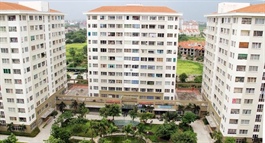State needs to remove obstacles in worker housing development
State needs to remove obstacles in worker housing development
Viet Nam has over 16 million workers in IPs, contributing over 60 per cent of the gross domestic product and 70 per cent of the State budget. However, the life of workers is still difficult and many IPs do not have housing for workers.

The State needs to have policies that encourage the development of housing for workers in industrial parks, according to experts.
Viet Nam now has 575 industrial parks (IPs) in 61 provinces and cities. They are mainly located in key economic regions, according to the Ministry of Planning and Investment.
Most enterprises have invested in production facilities but not in building social infrastructure for employees.
In the past two years, the complicated development of the COVID-19 has caused enterprises many difficulties. The fourth pandemic outbreak has caused many workers to leave IPs in the southern provinces and return to their hometowns. This has had a significant impact on production and business efficiency.
IPs nationwide have a shortage of social infrastructure for workers such as houses, entertainment areas and kindergartens for workers' families. This means that workers have to rent houses locally.
During the latest COVID-19 outbreak, travelling to and from work increased the potential of virus transmission.
According to Luu Duc Cuong, director of the National Institute of Urban and Rural Planning under the Ministry of Construction (MoC), planning in industrial zones plays a very important role in the national socio-economic development strategy. The planning will orient the development of Viet Nam's IPs to synchronise with the national urban and rural development.
Cuong said to solve the problem of housing for workers, it is necessary to have integrated solutions. Social housing development, including housing for workers in IPs, should be under the medium-term public investment portfolio for the period 2021-2025.
At the same time, the State needs to have credit packages for investors building social housing for workers. This will implement the 'dual goal' of ensuring housing for low-income workers and also promoting recovery of the economic development. These credit packages aim to remove difficulties for businesses and to support the development of the domestic real estate market.
He said while waiting for overall solutions, localities need to review IPs. If the industrial land has not been used, the authorities need to ask the investor to adjust their planning to include accommodation for workers.
“When formulating and approving IP construction planning, the localities must allocate land areas to build social infrastructure for employees working in IPs,” Cuong said.
In addition, the localities should have specific mechanisms and solutions to create favourable conditions for site clearance and administrative procedures, attracting investors to social housing development, especially houses for workers in economic zones, IPs and industrial clusters lease.
At the same time, they need to invest in essential infrastructure such as schools, kindergartens, and health care, sport and entertainment facilities in and out of social housing projects, especially in areas with a large number of workers, he said.
Ha Quang Hung, deputy director of MoC’s Department of Housing and Real Estate Market Management, said that Viet Nam has 214 housing projects for workers on a total area of about 600ha, including 116 projects that have been completed with an area of 250ha and 98 projects under construction. However, only about 41 per cent of apartments built on the total 250ha land area have been rented.
This means that the target of having at least 12.5 million sq.m of social housing in urban areas to meet the demand for about 70 per cent of workers in IPs, under the National Housing Development Strategy until 2020 and a vision to 2030, has not been met.
Proposals
Dao Cong Hung, deputy director of Bac Giang Department of Construction, has proposed to amend the Government’s Decree 82/2018/ND-CP on regulating the management of IPs and economic zones to request that an IP construction planning meet at least 50 per cent of the employees working in the IP.
Tang Ba Bay, deputy director of Hai Duong Department of Construction, also suggested that investors of IP infrastructure need to have responsibility on building houses for workers under the IP planning. In addition, the State should offer incentives to investors in site clearance and capital.
Pham Van An, deputy general director of Housing and Urban Development and Investment Corporation (HUD), said that the demand for worker housing is very large and the State has also had many mechanisms and policies to encourage worker housing development.
However, few investors are interested in this real estate segment because, compared with commercial housing projects, the social housing projects need more procedures relating to price approval, customer list, and a part of the rental housing area. That reduces the attractiveness of this sector for the investors, he said.
For State-owned enterprises, this is a niche market with lower competition, but they must still consider feasibility and efficiency, he added.
Decree 49/2021/ND-CP amending and supplementing a number of articles at the Government's Decree 100/2015/ND-CP on the development and management of social housing has basically removed a number of difficulties for the worker housing development. Decree 49 also has more incentives to create favourable conditions for both investors and homebuyers in the worker housing segment, An said.
However, Tran Ngoc Anh, deputy general director of the Viet Nam Glass and Ceramics Corporation (Viglacera), said there are still "bottlenecks" causing difficulties for workers and enterprises with production at the IPs in renting and developing worker housing products.
Many IPs have completed infrastructure but 80-90 per cent of workers of those IPs still have to rent houses outside the IPs, according to Ngoc Anh.
Vu Thi Hop, chairwoman of the Da Hop Trading Joint Stock Company, said that her company has been invested in worker housing projects since 2011. Its biggest difficulty is the overlapping of legal regulations.
Hop has proposed when the State builds standards and regulations for the construction of IPs and industrial clusters, it should pay attention to the living habits of workers. Along with that, the Government should give preferential capital for projects building workers' houses via commercial banks instead of only policy banks.
Pham Hong Diep, chairman and general director of the Shinec Joint Stock Company, said the preferential policies, especially in credit, would remove many difficulties for the investors in the development of worker housing.
























